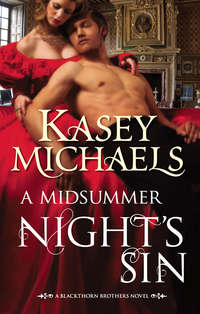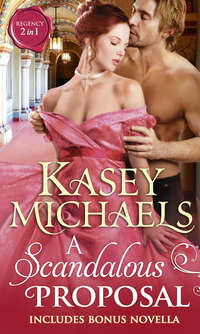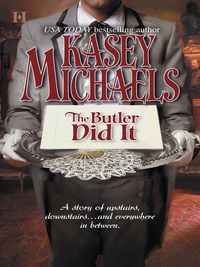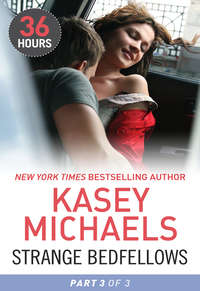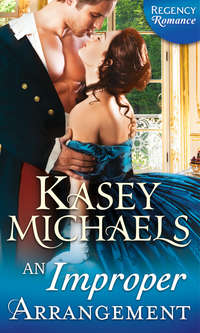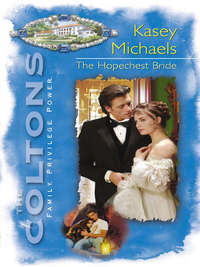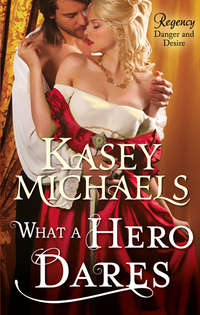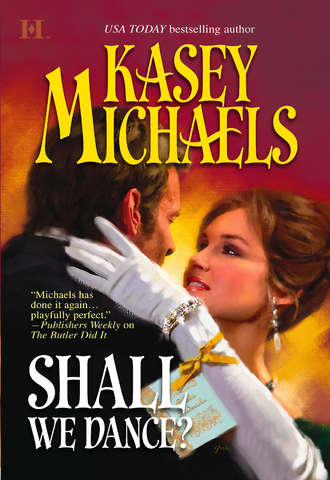
Полная версия
Shall We Dance?
“Pleases you, that part, doesn’t it? I’d noticed that. In fact, if it weren’t for knowing that this whole sham was my idea, I’d think it was yours.”
Georgiana smiled. “Could we just call it serendipity?”
“Among other things, yes,” Nate said, abandoning his position at the fireplace, to sit beside her on the couch. “Georgie—Georgiana,” he said, taking her hand in both of his, “I think we’re going to be very good friends.”
Georgiana pulled her hand free, and sniffed at him—yes, sniffed—for she was above all things a practical young woman. “Careful, Nate, or else Mr. Bateman will be posting the banns. You have a mission, remember? To save the queen?”
“Wrong. To save my own skin. The queen’s in no real danger. Even our king isn’t that harebrained. You’ll understand more when we leave here and travel to my family home.”
“I thought you said we were going to visit your aunt Rowena.”
“Yes, I did. She lives with her sister—my mother—and my poor, beleaguered father. He’s the one who is going to be kissing your shoetops when he learns that you are to be my entry to this establishment. Anything to placate my aunt and, most important, silence her.”
“Then we’ll return to Mr. Bateman’s house, and you’ll meet my mother and Mr. Bateman? You did promise, remember?”
“Lies upon lies. I remember. I’m not precisely sure why I’m feeling so jolly about all these lies, but I am. Do you need those spectacles, Georgiana?”
The question surprised her. “No, of course not. I only wear them when I want to look bookish, and a horrid bluestocking into the bargain. And when I want to see what I’m looking at,” she told him, leaning back slightly against the cushions on the suddenly small sofa. “Why? Mama says I’m lucky to get a third or fourth son, because of the spectacles. And the very slight dowry my late father arranged for me. Are they that awful?”
“Not as terrible as leaving them on your dressing table for vanity’s sake, then finding yourself talking up a potted palm at some party, no,” Nate said. “But I do believe we could seek out something not half so horrible. That is, more becoming to your face. Spectacles that at least fit.”
“They’re just heavy.” Georgiana slammed the offending spectacles back up on her nose. “Don’t all spectacles slip like this?”
“No. They don’t. I’m surprised you don’t knock yourself senseless at least a dozen times a day, poking at them like that. And the lenses aren’t all as big around as moons. I am no expert, but I believe you’re wearing gentlemen’s spectacles.”
“They were my father’s, yes, and my mother said they were more than good enough,” Georgiana admitted. “But different lenses were fitted for them.”
“And in fifty years, you might just grow into them. In the meantime, we can search out better ones tomorrow, before I take you driving in the Park at five for the Promenade, all right?”
Georgiana chewed on this for a moment, mentally cataloging her woefully inadequate wardrobe. “The Park? In public? I thought this was only for Amelia. And Aunt Rowena. And my mother and Mr. Bateman, so they’ll let me out of the house and you can play at saving the queen. But I thought that was all.”
“Really. The question that immediately springs to mind, Georgiana, is who are you ashamed of? Yourself. Or, more reasonably, of me? My mama, for one, would understand that.”
She stood up so quickly she banged a knee against the table and had to bite back a rather unladylike word. Country life and little supervision had done considerable damage to what were supposed to be her fragile female ways. “Now you’re making fun of me, and I must warn you, sir, that I am more than capable of giving back as good as I get.”
He also got to his feet. “Yes, I’d already noticed that. Dare I say you fair fascinate me?”
Georgiana looked at him, at his slightly unruly black hair, his laughing blue eyes, his altogether handsome face and figure. “Of course I do. I daresay I fascinate men every day,” she said dryly, believing not a single word that came out of his mouth, then looked toward the doorway. “What on earth could be keeping Amelia? Do you think anyone told her I’m here? I vow, this is the strangest household.”
BERNARD NESTOR made his way to the servants’ entrance of the establishment in Hammersmith and knocked loudly on the door.
He’d been up and about very early, and had been hidden behind some shrubbery since seven, in ample time to watch the departure of what he was convinced were the butler, two footmen, and one hatchet-faced woman, all of them carrying their belongings in various portmanteaus and tied-up sheets. The woman most definitely had at least one tall candlestick shoved up under her apron.
The one he’d decided had to be an upper servant, if not the butler, secured himself a hack within a half mile. So he’d followed the others on foot, all the way to the nearest pub, and sat himself down behind them to listen to their conversation.
Good, thoroughly stupid English citizens, the trio of them, all of them appalled by the charges brought against their queen. And all of them finding her guilty because it suited their judgmental spleens, with no need to hear a single fact when supposition was so juicy, and unwilling to spend another night beneath the roof of such a disgraceful woman.
And he’d been right. The fourth person had been the butler, who had already promised to assist them in gaining new employment in a more Christian, God-fearing household.
So the queen needed a new butler, did she? Well, it had been about time Bernard Nestor’s luck had changed for the better! And it wasn’t as if he wouldn’t know how to go on. He had lived in his father’s house, hadn’t he? He’d survived in that small office behind Brougham’s butler’s suite of rooms—rooms for a butler, with only a single, near-hole-in-the-wall for his most devoted assistant. Yes, he knew how to go on, and that knowledge, plus that niggling problem with the workings of his brain box, gave him untold courage, if not a chin.
Now he knocked again when no one answered, imperiously this time, and when the door finally opened, he stepped inside, declaring, “This is unpardonable. Never before have I been kept waiting! Who are you, woman? A name! Give me a name! Mrs. Fitzhugh? Housekeeper, I’ll assume, for your sins. I tell you, now that I am butler here anyone who doesn’t know how to behave will be shown the door, do you understand me? Even you, Mrs. Fitzhugh. Already the queen has been left unattended too long, which is highly upsetting to Miss Fredericks, you know. Well? Cat got your tongue? Show me to my quarters, search out the attics for suitable clothing I’m sure is kept there for upper staff, as my baggage has been stolen by a pair of ruffians on the dock. Oh, and you may call me Mr. Nestor.”
THE HOUSEKEEPER headed toward the main drawing room, wringing her still-trembling hands and talking to herself. “I tell you, Mrs. Fitzhugh, I don’t remember Mistress Fredericks saying a word about someone to replace Mr. Carstairs. It hasn’t been above a few hours since he left. She’s a quick one, I’ll say that for her.”
“Now, now, Maryann,” she answered herself, “just because you took the man in dislike doesn’t mean there’s anything wrong. Best to keep mum. Could get you the sack, seeing as how your background couldn’t exactly stand up straight to much of a look-see, even if he said he’d made things all right and proper and—”
“All right, all right. But I can’t like the man. He’s got no chin. Our uncle Oliver had no chin, remember? Those same shifty eyes. And he never missed a chance to pinch our bottom. I’ll not be turning my back on the likes of Mr. Nestor. Shh, footsteps.”
Both of Maryann Fitzhugh peeked around a corner of the hallway to see Gerado pacing with his head down, muttering to himself in that suspicious foreigner tongue.
“Here, here. You’re not to leave your post. Po-st. Position.” She raised one fist, pantomimed a rapping motion. “Door. Knock-knock.”
Gerado rolled his eyes. “Visitors for Miss Fredericks. Tea and cakes, si? And to tell Miss Fredericks? And, si, the knock-knock.” He raised both hands, palm up, and shrugged. “Where to go first, capire?”
“Yes, yes, I understand,” Mrs. Fitzhugh crowed, thrilled at this breakthrough. Why, she was almost talking Italian herself! She pointed to Gerardo’s chest. “You…go knock-knock Miss Fredericks. After, you go back to door knock-knock.” She placed both hands on her bosom. “I…go kitchen for cakes and tea.”
“Idiota,” Gerado said, nodding his head as he turned and walked away.
Feeling quite generous, now that she’d managed to settle a domestic crisis Mr. No-Chin Nestor should have by rights dealt with, Mrs. Fitzhugh returned to the kitchens, just in time to answer yet another knock on the service door. Busy place, a queen’s residence. How was she ever supposed to do what she came to do?
“Yes?” she asked imperiously, more prepared than she’d been when Mr. Nestor all but barged into the kitchens.
The woman on the doorstep was much of Mrs. Fitzhugh’s own age, fairly round—well cushioned—and marginally attractive in a faded sort of way.
She didn’t quite look the housekeeper in the eye as she dropped into an abbreviated curtsy. “My name, ma’am, is Esther Pidgeon, and I once served as maid in the queen’s household, when she was Princess Caroline. I know I am being horribly bold, and I have no current references, as I left service several years ago to marry. But now that Mr. Pidgeon is gone, and once I saw that the queen, that dear, sweet woman, has returned to our shores, I had hoped, foolishly, I’m sure, that I could possibly once more be of service?”
Mrs. Fitzhugh took in every word. “So, you’re not here because Miss Fredericks called you here somehow?”
“Miss Fredericks? No, I’m sorry. I can’t say as I can place the name. We worked under a succession of housekeepers, but that name is not familiar to me.”
A silent conversation ensued:
Maryann: She seems decent enough. But no references? He had to have them for me, so they must be important things to have.
Mrs. Fitzhugh: Oh, cut line, Maryann. You don’t have the foggiest notion how a housekeeper goes on. If this weren’t a household of crazy foreigners, that strange girl and one batty old woman, you’d never have gotten a toe in the door, no matter what he wrote. As it was, best thing could have happened was for that fool Carstairs to take a flit. He was looking entirely too hard at you.
Maryann: It would be lovely to have some say in who is hired, wouldn’t it?
Mrs. Fitzhugh: There you go. You want that odd Nestor fellow saying who stays and who goes? Call her your assistant, why don’t you? The girl wanted someone else anyway. Partridges and all that.
“Very well. You’re hired,” Mrs. Fitzhugh said, and then bullied one young housemaid who most obligingly burst into tears. All while Esther Pidgeon looked on approvingly.
NATE WATCHED, standing back to keep himself safe from the exuberant hugging and rather hysterical female screeching as Miss Fredericks and his Georgie greeted each other. His Georgie? What was he thinking?
“I didn’t know you were in London,” Amelia Fredericks said, holding tightly on to Georgiana’s hands as the two of them sank onto the couch. “I’ve already sent you a note, hoping you could come visit, but to your mother’s country house.”
“No, no, they brought me here, to marry me off to any poor fool who would have me,” Georgiana said, then quickly looked up at Nate, panic in her eyes. “That is, um, Amelia? I should like to introduce to you my…my, um…”
“Sir Nathaniel Rankin, Miss Fredericks, although you may feel free to think of me as a prospective poor fool,” Nate said quickly, executing what he knew to be an impeccable leg. “A delight, I’m sure. Georgiana has told me that you and she are great friends. How affecting it is to see such joy in Georgiana’s eyes.”
“Sir Nathaniel,” Amelia said, allowing him to bow over her hand. “I cannot thank you enough for bringing Georgiana to me.”
“Yes,” Georgiana said, glaring up at him. “And now he’s going to take himself outside to check on a coach that we passed on the roadway, stuck in a ditch, and offer his assistance in righting it. Aren’t you, Nate?”
“I am? Oh, yes, of course, I am, I am. You two ladies just sit here and natter and I’ll be out of your way.”
A maid entered the room, carrying a heavy tea tray, and Nate grabbed up a freshly baked cherry tart on his way out the door, gratefully leaving Georgiana and Amelia alone to talk about whatever it is females talk about that men don’t really care to know.
A half hour later, having enjoyed himself to the top of his bent in putting his back to pushing the Bateman coach out of the ditch, Nate wiped one muddy hand across his cheek as Georgiana appeared behind him, her hands on her hips and a smile on her face.
“You’re filthy,” she said. “And you look embarrassingly happy about it.”
“It was tricky,” he told her as he pulled out his handkerchief, which Georgiana took, then held up to his mouth so that he could spit on it. “Oh, I say, Georgiana, don’t play mother with me—oh, all right.” He closed his eyes, spit on the linen. “The wheel was fairly stuck, but m’tiger and I figured out how to shift it.”
She scrubbed at his cheek. “Yes, I know. Amelia and I watched through the window. She thinks you’re a very nice gentleman. I think you’re an idiot, but a very nice idiot. Now, shall we go meet your aunt?”
“LAND HO, SIR, or ahoy, or whatever it is.” Clive scrambled to his feet once more in the boat, putting one foot up on the low bow to steady himself as he pointed toward the shore. “And there be a lady on the boards, M’Lord, watchin’ us come. See her?”
Perry narrowed his eyes and followed Clive’s pointing finger with his gaze. “It could be, my friend, that we’ve struck gold on our first shovelful. Seems the artist was more talented than I’d supposed. Not beautiful, but still rather striking.”
“She’s the one Sir Willard talked about? Miss Fredericks?”
“I think so, yes. But now brace yourself, Clive, or else you’ll—ah, too late,” he said as the Bow Street Runner, decked out in all his naval finery, toppled head-first into the water. “How very inventive of you, Clive. But, then, I knew you’d come in handy. What a splendid entrée into the queen’s residence, although first, alas, I’ll probably be forced to save you. You there—yes, you. Mind scooping up my friend with your oar before he sinks again? Don’t worry about the hat, it’s no great loss. There’s a good fellow.”
Then he looked to the small pier, where the young woman he most ardently hoped would indeed turn out to be Miss Amelia Fredericks was calling out orders to have Clive rescued, then brought up the hill to the queen’s residence.
Life, as Perry Shepherd had often found, was good.
THE QUEEN’S hastily put-together residence at Hammersmith.
Quite a crowded place.
The queen, of course, caught between her broken dreams and an attacking husband bent on destroying her.
Amelia Fredericks, practical, yet still harboring secret dreams, and utterly devoted to her queen.
Perry Shepherd, Earl of Brentwood, sent against his will and better judgment to seek out scandal by his uncle, Sir Willard, a staunch Tory and thus aligned against the queen.
And his faithful (and, at the moment, rather soggy) dogsbody, Clive Rambert.
Georgiana Penrose, Amelia’s childhood friend, unaware of any intrigue, but happy to tell most any fib if it puts her in her friend’s company and, frankly, keeps her mother and Mr. Bateman away from her as much as possible.
Sir Nathaniel Rankin, baronet, a young man who has reluctantly taken on one chore, protecting the queen on orders from his dotty aunt Rowena, only to find a second, much more enjoyable way of occupying his time.
Mrs. Maryann Fitzhugh, a most unlikely housekeeper, both of her.
Bernard Nestor, out to make any mischief, find any proof that would further his ambition…er, the queen’s case.
And Esther Pidgeon, still pining for her Florizel, a woman for whom dreams have become an obsession, and willing to go to any lengths to destroy the upstart queen. Any lengths. Any.
Let The Games Begin
Pussycat, pussycat, where have you been?
I’ve been to London to visit the Queen.
—Anonymous
AMELIA HAD SPENT a lovely half hour with her good friend Georgiana before an urgent summons from the queen’s maid had cut their visit short. With promises to see each other again as soon as possible, Amelia had hastened off to the queen’s chamber, expecting to find Her Majesty still abed, still playing at tragedy queen (not that she didn’t have good reason).
Instead, she’d found Her Majesty at her dressing table, her eyes half-shut while a fussing maid applied rouge to her cheeks.
As there was no sign that the bathtub had been employed, or even the pitcher and ewer on a dressing table to one side of the room, Amelia knew that the queen was in some sort of rush—and when the queen was in a rush, personal hygiene took a distant back seat to wherever the woman was in a rush to.
“Your Majesty,” Amelia said, curtsying to the queen.
The rouge pot and brush went flying when the maid, clearly unprepared for Her Royal Majesty’s abrupt about-face in her chair, turned on Amelia to ask in some excitement, “Did you see? Did you see?”
“See, ma’am? I’m sorry—”
The queen fluttered her ringed fingers toward the bank of long windows. “Oh, just go look—look! My people. My subjects! They come to bow to their queen, Amelia, in her hour of greatest need. I will win! You’ll see, you’ll see. For once in my life, I will best him. I will win!”
Amelia had gone to the windows, knowing what she would see below her, in the water. Boats. Boats and more boats, of every shape and size. And then she leaned closer to the glass. “There are banners,” she said. “Signs.”
“Yes, yes,” the queen said, returning her attention to her toilette. “I had someone fetch me a spyglass. See it? Pick it up, my dear, and read to me from the banners.”
Amelia located the spyglass on a table and did as she was bid. “Long Live Our Queen,” she read, peering through the glass. “Hip, Hip, Hooray.” She saw two more: Kick His Arse, Caroline, and Show Us Some Bottom, Dearie, but those she did not repeat to Her Majesty.
“You have so many admirers, ma’am,” Amelia said, sliding the spyglass shut and replacing it on the table. “In England, indeed, in the world. It is so very gratifying.”
“Ha! It’s tweaking that miserable husband of mine, that’s what it’s doing. I can see him now, being told of what’s happening. Stomping his feet, weeping copious tears into the bosom of his latest fat, aged mistress, calling for his leeches so that he can be bled of his ill humors. My heart has not been so light for years! Oh, enough, enough. When I wave from the balcony all they’ll see will be their queen, not her wrinkles,” she said, batting away the maid’s hand. “Amelia, we must keep them coming here, hold on to their loyalty. Feed it.”
Which was how Amelia had ended up donning a light wrap and picking her way down the flights of wooden stairs that eventually led to the small pier where she now stood with three footmen carrying heavy baskets of cakes and fruit, watching a pathetic man being pulled out of the water by the seat of his pants.
“Gently, my good man, gently. We shouldn’t wish to crease him.”
That voice, laden with amusement. Who’d said that? Who would say such a thing?
Amelia tore her frightened gaze away from the unfortunate fellow just now coughing and gasping on the pier, and looked at the gentleman gracefully picking his way to the front of the lightly rocking boat, then onto that same pier. He planted his cane on the dock, pressed both hands on the knob and leaned forward slightly, to look down at the nearly drowned man.
“Gad, Clive, all that spluttering. I warned you to be careful. Or did you think you’d spied out a mermaid?”
The nearly drowned man choked on yet another cough and raised his face to the man. “I coulda drownded.”
“Nonsense, my good man. If you had but stood up, I imagine you could have kept your chin above water. Hmm…perhaps your eyebrows. A pity. If only his legs were straight, he might not have drowned. Correction, drown-ded. How’s that for a sorry epitaph? Good thing I saved you.”
“You did no such thing, sir,” Amelia declared, motioning for the footmen to put down their baskets and help the wet man to his feet. “If anything, I would say you’ve seen this poor unfortunate’s nearly fatal accident as…as some sort of joke.”
The man—he was a man, surely; just a man; not some fairy-tale prince—immediately stepped in front of the wet man, removed his curly brimmed beaver and executed a most flamboyant leg in Amelia’s direction, his startlingly clear green eyes raking her from top to toe even as he straightened up once more, smiled a smile that all but took her breath away.
“A thousand apologies, miss. A hundred thousand apologies. I am a cad, a heartless cad. But I did warn him.” His cool, green gaze still on Amelia, he asked, “Didn’t I warn you, Clive?”
“Not near soon enough,” Clive admitted as he got to his feet on the slippery dock, then turned in a full circle. “My hat! Where’s m’hat? Here, now, somebody fetch up my hat. Three quid that thing cost. Feed me for a month or more, three quid.”
“Control yourself, Clive, if you please,” the gentleman said, still looking at Amelia, who felt a sudden need to cross her arms over her bosom, for she felt stripped naked by that amazingly intense green gaze. “If I might introduce myself?”
Amelia waved her right hand slightly, as though talking might very well be beyond her at the moment. Never had she seen anyone so…so nearly perfect. Like a dashing hero out of her dreams.
“Thank you, dear lady. I, for my sins, am Perry Shepherd, Earl of Brentwood, delirious to be in your presence, as I had been racking my sorry brain for some paltry excuse to wrangle an introduction. You are Miss Amelia Fredericks, correct?”
“I, um, excuse me?”
“Yes, yes, use the oar, man. Snag it up with the oar. Oh, come on, now, lads, put some back inta it, the thing’s floatin’ away. Wait, never mind, it’s comin’ back this way. I can do it m’self. I’ll just…lean…out…and…reach for—”
Splash.
“‘Once more into the breach, dear friends, once more,’” the Earl of Brentwood said on a sigh, quoting The Bard as he turned about to incline his head to the oarsmen.
Amelia bit back a giggle (horrible of her to be amused, but there was no helping it) as the man named Clive was once more hauled onto the dock, this time with his hat upside down, brim clenched firmly between his teeth.
“God-id,” Clive said, then spit out the brim. “Got it.”
“Yes, my felicitations, I’m sure,” the earl said even as he winked at Amelia as if they’d just shared a private joke. “The only wonder is that you haven’t also landed a fish. Shake out the hat, Clive, why don’t you, and we’ll see if you have indeed been so lucky.”
“Not me, M’Lord. Now yerself?” Clive said, trying to brush bits of water weed off the hat. “Yer woulda come up with a turbot, already skinned and cooked, with a lemon stuck in its mouth.”
“Most probably, yes.” The earl bowed to Amelia once more. “You will excuse him, Miss Fredericks, as Clive here feels our friendship knows no bounds.”
Years of maintaining control of her emotions when presented with the oddest of sights came to Amelia’s aid, and she said evenly, “You address me by name, sir. How is that, as I am quite sure we have not been introduced.”
Behind His Lordship, Clive shook himself like a puppy, spraying water everywhere, including on His Lordship.
Brushing at his sleeves, the earl said, “I believe Miss Fredericks has suggested you be escorted to the queen’s residence, Clive, an invitation I strongly suggest you accept while I remain here and stammer out the reason for this quixotic arrival of mine.”


